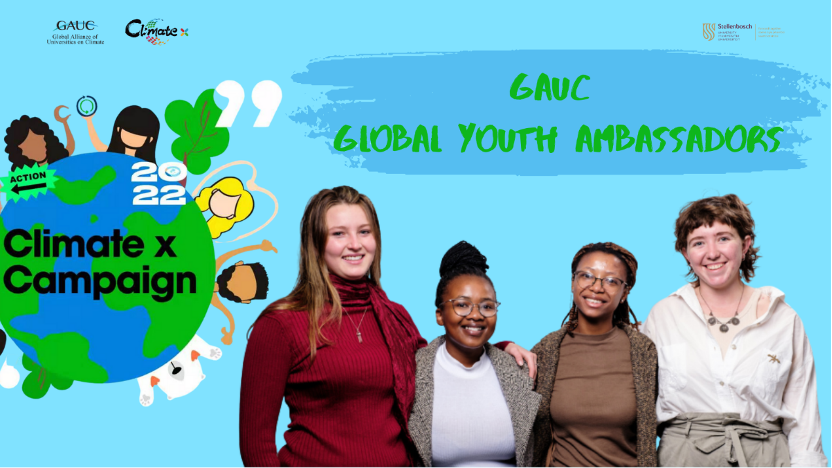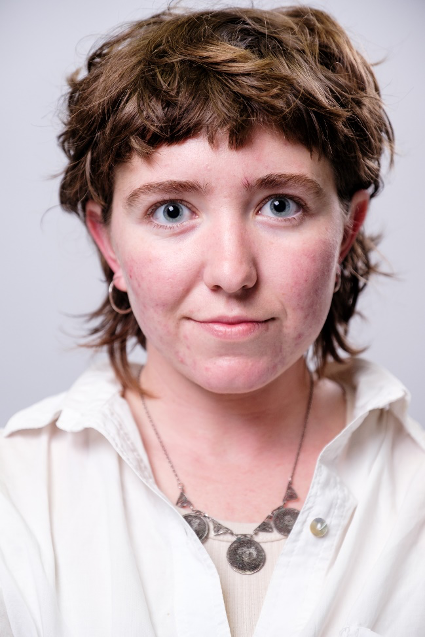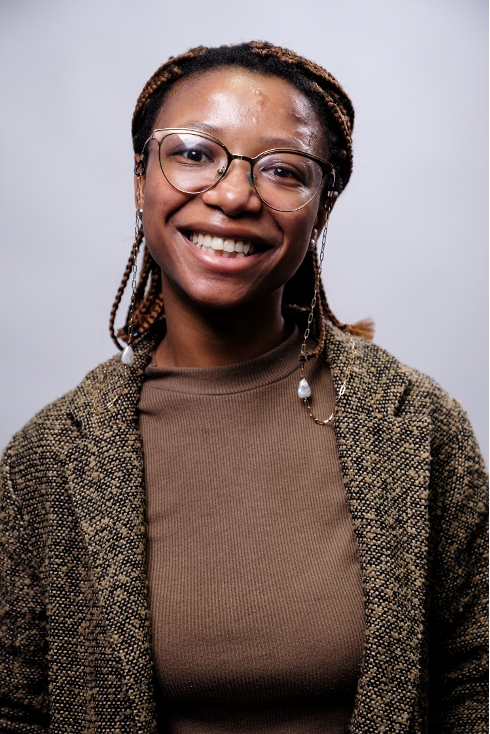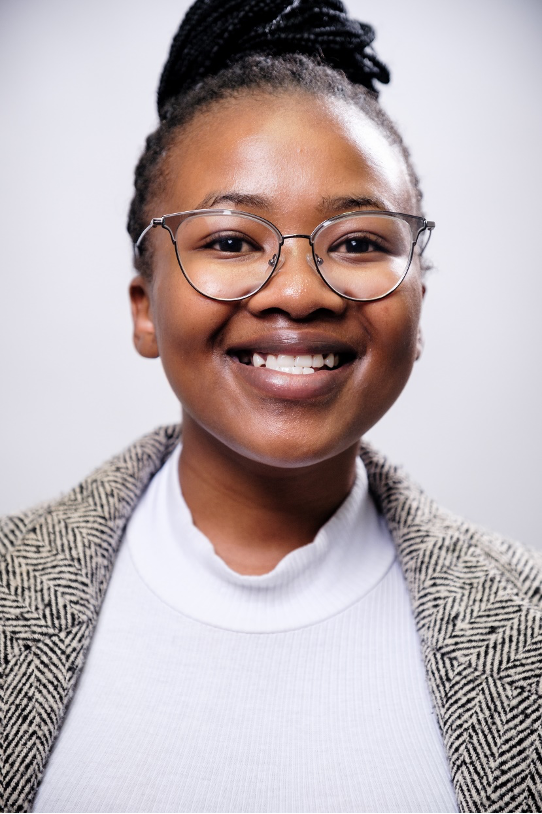
Four postgraduate students from Stellenbosch University (SU) will represent Africa in the world's first youth climate leadership training project: the 'Climate x' Leadership Training Pilot launched by the Global Alliance of Universities on Climate (GAUC).
Olivia Jones, Nosipho Gqaleni, Yenziwe Mbuyisa and Kayleigh Murray, all postgraduate students in the Department of Botany and Zoology, have been selected as GAUC ambassadors for 2022. They will participate in a number of training events leading to the GAUC Global Youth Summit in Cairo and the United Nations Climate Change Conference (COP27) in Sharm el-Sheikh, Egypt, in December.
They will be joined by ambassadors from other GAUC member universities, including SciencesPo in France, Tsinghua University in China, Imperial College London and the London School of Economics and Political Sciences in the United Kingdom, the Australian National University, the Indian Institute of Science and four universities in the United States of America: Columbia University, Yale University, Massachusetts Institute of Technology, and University of California, Berkeley.
We asked the four GAUC ambassadors from Africa a few questions about their research, their commitment to fighting climate change, and their expectations for the year:
Kayleigh Murray
![]()
 Kayleigh is an MSc student in the global change biology research group in the Department of Botany and Zoology. She uses new methods in genome sequencing to investigate the distribution and genetic viability of different populations of the quiver tree, which is threatened by warmer temperatures. For her research, she is also working with the new Climate Studies School at SU, as well as the accelerated taxonomy lab at the Royal Botanic Gardens in Kew, London.
Kayleigh is an MSc student in the global change biology research group in the Department of Botany and Zoology. She uses new methods in genome sequencing to investigate the distribution and genetic viability of different populations of the quiver tree, which is threatened by warmer temperatures. For her research, she is also working with the new Climate Studies School at SU, as well as the accelerated taxonomy lab at the Royal Botanic Gardens in Kew, London.
With regard to the GAUCC ambassadorship, she says policy is a foreign concept to her: “We stand in academic silos of specialised information, looking at other fields without true transdisciplinary understanding. I hope to learn what kind of evidence is needed to inform policies and decision-making, and how best to bridge the gap".
As a scientist, she would like for her research to contribute to adaptation planning and practice: “I want to contribute from my field of research towards a transdisciplinary approach to understanding climate change, and in the process to learn from other disciplines in the humanities, social sciences and economics."
Kayleigh grew up in Gabarone, Botswana, and completed high school in Cape Town.
Yenziwe Mbuyisa
 Yenziwe is an MSc student in the global change biology research group, where she is investigating the potential of using native species in afforestation and restoration initiatives, as opposed to exotic species that use a lot of water.
Yenziwe is an MSc student in the global change biology research group, where she is investigating the potential of using native species in afforestation and restoration initiatives, as opposed to exotic species that use a lot of water.
As a GAUCC ambassador, she hopes to learn more about the governance, policy and economic aspects of climate and environmental awareness: “I am interested in restorative environmental justice. In the future I would like to play a role in education, and helping vulnerable and disadvantaged peoples to understand climate change and how to deal with it".
She believes there is a misconception about how these groups value and understand the environment. This means their needs and priorities are easily side-lined in policy and governance decisions: “I hope to use this opportunity to gather as much information as possible to enable me to give back to those who are often excluded. We need justified climate action that protects and serves vulnerable communities.
Yenziwe was “born and bred" in Ladysmith. KwaZulu-Natal, and matriculated from Ladysmith High School in 2015.
Olivia Jones
 Olivia is a BSc Honours student in the global change biology research group, and plans to become a climate change ecologist: “My long-term goal is to contribute to research in this field, as well as being actively involved in the implementation of climate and conservation innovations. At a time when extraordinary events are already occurring and perilous extremes are imminent, I believe that climate change ecology is currently one of the most relevant and important fields of work.
Olivia is a BSc Honours student in the global change biology research group, and plans to become a climate change ecologist: “My long-term goal is to contribute to research in this field, as well as being actively involved in the implementation of climate and conservation innovations. At a time when extraordinary events are already occurring and perilous extremes are imminent, I believe that climate change ecology is currently one of the most relevant and important fields of work.
Her research project focuses on a population of sociable weavers (Philetairus socius) in the Southern Kalahari. These birds are regarded as important ecosystem engineers, as they are the only known birds to construct large nests in trees, often housing up to a hundred birds over several generations. Because of its size and permanent structure, a large number of organisms depend on the nests for shelter and food. However, with changing rainfall patterns in the area, it may affect the number of nests and hence the associated biodiversity of organisms.
Apart from the fact that the GAUCC programme is an outstanding networking opportunity, she believes strong networks of like-minded people are the only way to generate the shift required to reverse climate change and reach net zero emissions.
“I would really like for society to perceive humans as an intrinsic part of nature and see the necessity of caring for it, to maintain the delicate balance of life on earth. There is no single solution to climate change, so we need many people working in many sectors and across culture, age and gender".
Olivia was born in Zimbabwe, but moved to South Africa at the age of four. She completed matric at Springfield Convent School in 2018.
Nosipho Gqaleni
 Nosipho is an MSc student in the global change biology research group in the Department of Botany and Zoology. She studies the seasonal rainfall patters in the Nama Karoo, and how that relates to soil moisture and how efficient ecosystems use water.
Nosipho is an MSc student in the global change biology research group in the Department of Botany and Zoology. She studies the seasonal rainfall patters in the Nama Karoo, and how that relates to soil moisture and how efficient ecosystems use water.
She says she hopes the programme will help her to navigate the complexities of climate change and the sustainable development goals: “I want to be able to identify those areas where impactful change can be achieved within my sphere of influence."
In the final instance, she adds, it is because of our activities that the ecological balance has been disturbed: “We must make sure that instead of over-exploiting environmental resources, we conserve them and thereby slow down the rate of climate change".
Nosipho grew up in a village called Libode in the Eastern Cape and matriculated from St John's College in Mthatha.
On the cover photo, from left to right: Olivia Jones, Yenziwe Mbuyisa, Nosipho Gqaleni and Kayleigh Murray. Photo credit: Stefan Els
Author: Wiida Fourie-Basson
From the website of Stellenbosch University http://www.sun.ac.za/english
- end -

Marching towards COP30 – GAUC Action Plan for Belem

Youth Shaping the Future of Climate Governance: The 5th Global Youth Summit on Net-Zero Future Successfully Held

Mr. Jerome L’host Led Sessions on Youth Leadership in 2025 Climate x Leadership Training Program
